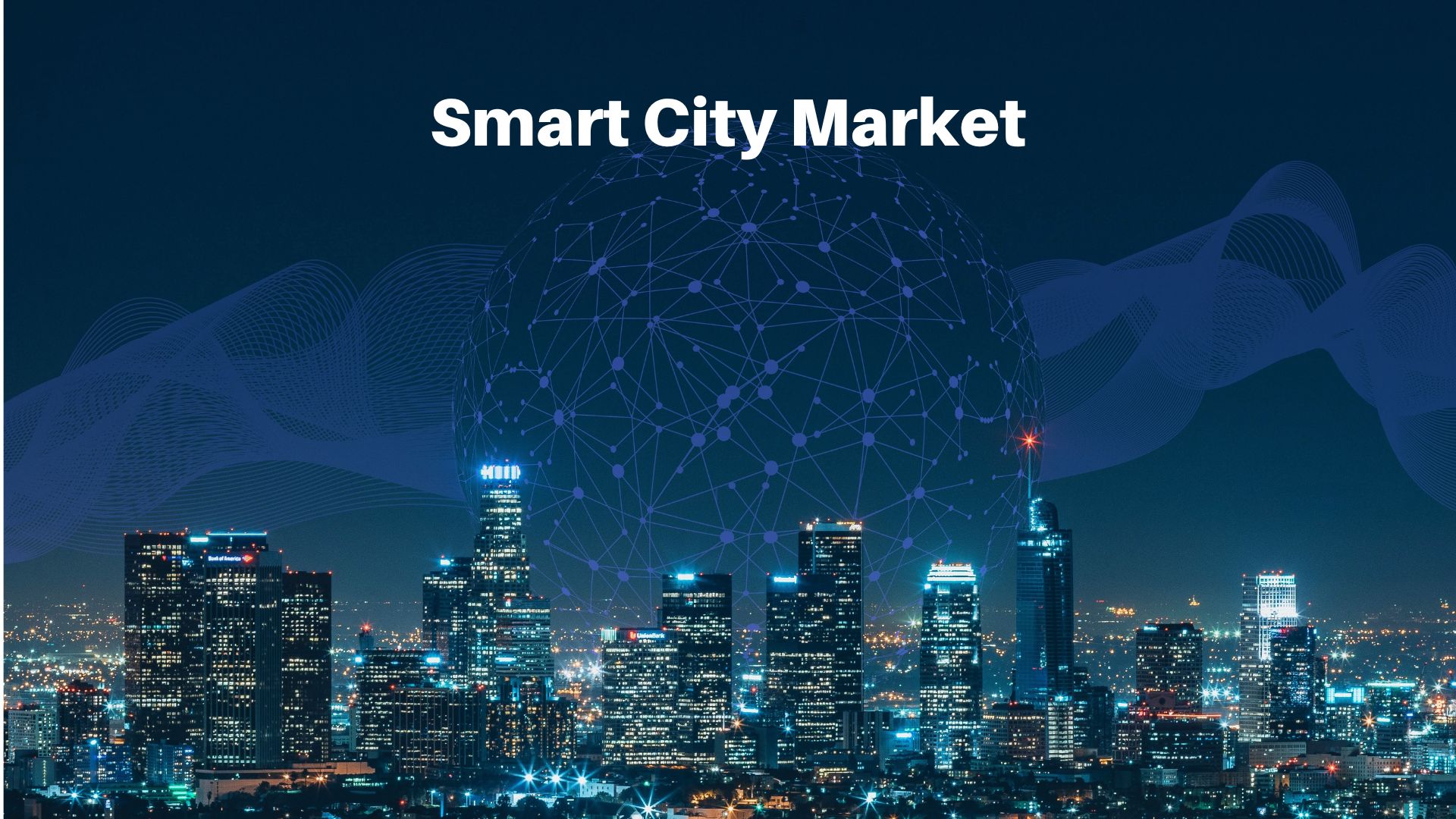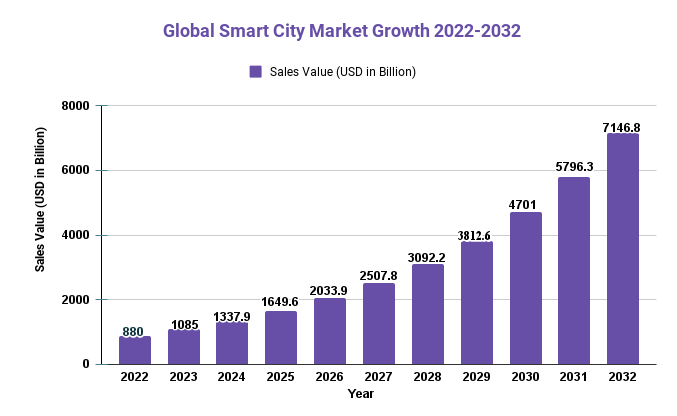Smart City Market Revenue to Cross USD 7,146.8 Billion, Globally, by 2032

Page Contents
Market Analysis
Published Via 11Press: The Global Smart City Market is expected to reach USD 7,146.8 Billion by 2032 from USD 880 Billion in 2023, growing at a compound annual growth rate of 23.3% during this forecast period from 2022-2032.
The smart city market is an emerging industry that uses technology to improve urban quality of life and enhance sustainability. This market encompasses various technologies and services such as smart grids, transportation services, buildings with advanced features and governance applications that make a city smart.
Asia Pacific is expected to lead the smart city market, followed by North America and Europe. This trend can be attributed to rapid urbanization in countries like China and India and their rising adoption of smart technologies.
Cisco Systems, IBM, Siemens AG, Schneider Electric and Huawei Technologies are some of the top players in the smart city market. Each is investing heavily in research and development efforts in order to offer innovative solutions that address market needs as they change.
Overall, the smart city market should experience significant expansion over the coming years as governments and private sector organizations prioritize creating sustainable and intelligent urban infrastructure solutions.

Drivers, trends, and challenges have an impact on market dynamics, which can impact businesses. Request for PDF sample report
Key Takeaways
- The Global Smart City Market size is projected to reach USD 6782 Billion by 2032 from USD 880 Billion in 2023, expanding at an average compound annual growth rate of 23.3% during this forecast period from 2022-2032.
- Market growth is being propelled by factors like an increasing population in urban areas, the need for energy efficiency improvements and growing demands for improved public security.
- The smart city market encompasses an array of technologies and services, such as smart grids, transportation networks, buildings and governance solutions. Asia Pacific is projected to lead this field, followed by North America and Europe.
- Cisco Systems, IBM, Siemens AG, Schneider Electric and Huawei Technologies are among the key players in the smart city market.
Regional Snapshot
- Asia Pacific: This region is expected to lead the smart city market due to rapid urbanization and increasing adoption of smart technologies across China and India, among others. Furthermore, government initiatives and investments into creating smart cities is anticipated to fuel significant growth within this market.
- North America: Given its large presence of key players like Cisco Systems and IBM, North America is expected to account for a considerable share of the smart city market. Furthermore, this region has witnessed an increasing need for innovative smart technologies to enhance public safety, energy management and infrastructure improvements.
- Europe: Europe is projected to experience significant growth in the smart city market due to government initiatives and investments in smart city development, especially Germany, France and UK's investments into smart grids, transportation systems and buildings.
- Rest of World: Other regions such as the Middle East and Africa have also seen rising investments in smart city developments, driven by factors like urbanization and the demand for better infrastructure and services.
Drivers
- Rising urbanization: As more people move into cities, demand for smart city solutions to improve quality of life, promote sustainability and more effectively manage resources is on the rise.
- Energy management: With energy consumption and carbon emissions constantly on the rise, smart grids and other energy-saving technologies becoming an integral component of smart cities.
- Demand for improved public safety: Intelligent city technologies such as video surveillance, emergency response systems and intelligent traffic management systems are increasingly deployed to increase public safety.
- Government Initiatives and Funding: Governments around the world are investing in smart city development through initiatives and funding, creating growth opportunities in this market segment.
- Technological Advancements: Technological advancements such as IoT, AI and big data analytics are driving growth in the smart city market.
Restriction
- High Implementation Cost: The implementation costs associated with smart city solutions may be prohibitively high and could prevent their adoption in certain regions.
- Lack of Standardization: Smart city solutions without standardization could pose an obstacle to interoperability and limit their development into integrated solutions.
- Cybersecurity Issues: Smart cities rely heavily on digital technology, raising cybersecurity risks that could compromise public trust and hinder their adoption as solutions for smart city solutions.
- Resistance to Change: Resistance from existing systems and processes could pose an impediment to adopting smart city technologies.
- Limited technical expertise: Lack of trained professionals in fields like AI and big data analytics could impede the creation and implementation of smart city solutions.
Opportunities
- Increased adoption of IoT devices: With IoT devices like sensors and smart meters becoming more widely adopted in homes and communities around the globe, the smart city market offers significant expansion potential.
- Integration of AI and Big Data Analytics: Integrating artificial intelligence and big data analytics in smart city solutions could provide invaluable insight and improve decision-making processes.
- Development of 5G networks: 5G networks could facilitate smart city technology deployment by providing faster and more reliable connectivity.
- Adoption of cloud computing: Adopting cloud computing could enable cost-effective yet scalable deployment of smart city solutions.
- Sustainable Infrastructure Development: Sustainable infrastructure such as green buildings and renewable energy systems offer smart city markets an opportunity for growth.
Challenges
- Lack of Interoperability and Standardization: Without proper interoperability and standardization between smart city solutions, integration and deployment may become problematic.
- Cybersecurity Risks: Smart cities' growing reliance on digital technologies has raised serious cybersecurity risks that threaten public trust and can hinder adoption of solutions tailored to smart city environments.
- Implementation Challenges: Implementing smart city solutions may present implementation issues such as limited infrastructure, funding or stakeholder buy-in.
- Privacy Considerations: Smart city solutions could raise concerns regarding privacy when collecting and using personal data, which may compromise public trust and hinder adoption.
- Skilled Workforce Shortage: A shortage of skilled professionals in areas such as AI, big data analytics and cybersecurity could create challenges to the development and implementation of smart city solutions.
Recent Developments
- In January 2022, Cisco Systems announced the launch of its Smart City Accelerator Program, which aims to help cities develop and deploy smart city solutions.
- In November 2021, Siemens AG announced the launch of its Smart Infrastructure Hub, which provides a platform for the development and deployment of smart city solutions.
- In September 2021, Alphabet Inc.'s Sidewalk Labs announced the launch of Mesa, an open-source platform for smart city development.
- In August 2021, Schneider Electric announced the acquisition of Renewable Choice Energy, a provider of renewable energy solutions for businesses.
- In July 2021, Huawei Technologies announced the launch of its Smart City Intelligent Operation Center, which provides an integrated platform for the management of smart city solutions.
Key Market Segments
Based on Application
- Smart Governance
- Smart Building
- Environmental Solution
- Smart Utilities
- Smart Transportation
- Smart Healthcare
- Other Application
Based on Governance
- City Surveillance
- S.
- E-governance
- Smart Lighting
- Smart Infrastructure
Based on Utility
- Water Management
- Waste Management
- Energy Management
Based on Smart Transportation
- Intelligent Transportation System
- Parking Management
- Smart Ticketing & Travel Assistance
Top Key Players
- ABB Limited
- AGT International
- AVEVA Group plc.
- Cisco Systems, Inc.
- Ericsson
- General Electric
- Honeywell International Inc.
- International Business Machines Corporation
- Itron Inc.
- KAPSCH Group
- Huawei Technologies Co., Ltd.
- Microsoft Corporation
- Oracle Corporation
- Osram Gmbh
- SAP SE
- Schneider Electric SE
- Siemens AG
- Telensa
- Verizon
- Vodafone Group plc
- Other Key Players
Report Scope
| Report Attribute | Details |
| The market size value in 2022 | USD 880 Bn |
| Revenue forecast by 2032 | USD 7,146.8 Bn |
| Growth Rate | CAGR Of 23.3% |
| Regions Covered | North America, Europe, Asia Pacific, Latin America, and Middle East & Africa, and Rest of the World |
| Historical Years | 2017-2022 |
| Base Year | 2022 |
| Estimated Year | 2023 |
| Short-Term Projection Year | 2028 |
| Long-Term Projected Year | 2032 |
FAQs
Q: What is a smart city?
A: A smart city is a city that uses advanced technologies, such as the Internet of Things (IoT), artificial intelligence (AI), and big data analytics, to improve the quality of life, enhance sustainability, and better manage resources.
Q: What are some examples of smart city solutions?
A: Smart city solutions include smart grids, smart transportation, smart buildings, smart governance, and smart public safety systems.
Q: What are the benefits of smart city solutions?
A: Smart city solutions can improve energy efficiency, enhance public safety, reduce traffic congestion, improve air quality, and enhance the overall quality of life in cities.
Q: What are the challenges of implementing smart city solutions?
A: Challenges of implementing smart city solutions include high implementation costs, lack of standardization, cybersecurity risks, resistance to change, and shortage of skilled professionals.
Q: What is the future of the smart city market?
A: The smart city market is expected to continue to grow in the coming years, driven by factors such as increasing urbanization, government initiatives, technological advancements, and the need for sustainable infrastructure.
The team behind market.us, marketresearch.biz, market.biz and more. Our purpose is to keep our customers ahead of the game with regard to the markets. They may fluctuate up or down, but we will help you to stay ahead of the curve in these market fluctuations. Our consistent growth and ability to deliver in-depth analyses and market insight has engaged genuine market players. They have faith in us to offer the data and information they require to make balanced and decisive marketing decisions.